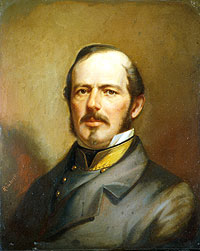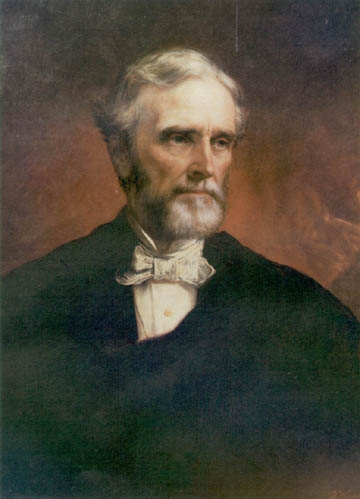 About five years ago, I stumbled across a self-published biography of E.V. Sumner in the main branch of the Boston library system. It was copyrighted 1968 and the author claimed descent from Sumner. That was two moves ago and I have hope yet of finding my notes on this tome.
About five years ago, I stumbled across a self-published biography of E.V. Sumner in the main branch of the Boston library system. It was copyrighted 1968 and the author claimed descent from Sumner. That was two moves ago and I have hope yet of finding my notes on this tome.The book was fluffy, low on details and high on background information. It contained just one single line that intrigued me, something like "The connection between General Sumner and his cousin Sen. Charles Sumner is much overstated."
Overstated by whom? Where? When? I had not and have never since seen this connection alluded to in print, and yet it is fundamental to any conversation about Lincoln's appointment of the first four commanders of the Army of the Potomac. If the connection is real, every account of the appointment of Sumner is damaged. Every one is compromised.
On my own account, I have research to perform on Sumner and have not even gotten to Bates' diary, which has to be my starting point. Shame on me too.
But I have some idea of the relationship of McClellan and Sumner, thanks to The Delafield Commission and the American Military Profession. At the center of that relationshi
 p stand McClellan's mentors Joe Johnston (top right in 1861) and Secretary of War Jefferson Davis (bottom right as of 1874).
p stand McClellan's mentors Joe Johnston (top right in 1861) and Secretary of War Jefferson Davis (bottom right as of 1874).At the time of the Crimean War, Edwin V. Sumner was the commander of the First U.S. Cavalry Regiment. Joe Johnston was his lieutenant colonel and George McClellan one of his captains (i.e. squadron commanders).
Johnston has left us an aphorism about Sumner. The key to getting along with him, Johnston said, was to assume he knows everything and you know nothing. IIRC, Sears uses this quote to characterize EVS in one of his many Centennial writings.
In Delafield Commission, the author resurrects an even more pungent quote from Johnston's correspondence with McClellan: "This regiment has not begun to be so yet - & can not until we have a system to control its head [Sumner]. You have yet to learn how ignorant a man can keep himself who relies, for knowledge, upon experience, & yet never observes or remembers."
A man who never observes nor remembers.
In a series of letters to Europe, Johnston inveigles McClellan to bring back cavalry doctrine: "The result of your expedition should be put into print as soon as practicable .... & you must of course attend to what pertains to cavalry." McClellan obliged. He left Mordecai and Delafield far behind in the rush to print and - to the apparent irritation of the author of Delafield Commission, McClellan's report from Europe was overwhelmingly concerned with cavalry, especially Russian cavalry doctrine.
The game was (for JJ and GBM, to quote Delafield Commission again) to prevent Sumner having a formative influence on the new cavalry arm. "In Johnston's opinion, senior officers like Sumner would allow the cavalry to wither and die if something was not done to codify professional standards."
Delafield Commission does a good job of recapping Johnston's complaints against Sumner's management of a cavalry regiment and there is more here than I can recap at reasonable posting lengths. The core issue is that Johnston enlisted his young friend McClellan for a doctrinal push against McClellan's most important patron, Jefferson Davis: "So take advantage of your interviews with the Sec. in Washington [Davis] to impress upon him the necessity of something more reliable , for the management of horses and horsemen, than the knowledge and intelligence of superior officers [Sumner], which at present are very unrelieable. We are without cavalry regulations and must have them - or we shall never have cavalry."
McClellan took Johnston's mail to heart. He drafted cavalry doctrine and regs, translated Russian cavalry manuals on the QT (he was, after all, a prodigy whose genius embraced languages) and he sought interviews to present this material to Davis.
Davis, foreshadowing the typology of stubborness that has become an ACW cliche, refused to be moved by McClellan's overtures. Sumner would remain undisturbed by new thinking.
Frustrated in his cavalry dealings with Davis, McClellan quit the army. At least, he seems to have gotten a pall bearer out of the deal (Joe Johnston, as is widely known).
Odd to think that Sumner was, in his way, the root cause of McClellan's resignation. Nor would it be at all interesting except that Sumner was made corps commander under McClellan by Lincoln.
And that, my friends, has as much to tell us about life as it does about Civil War history.



